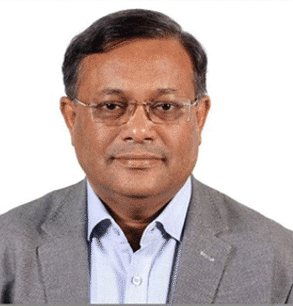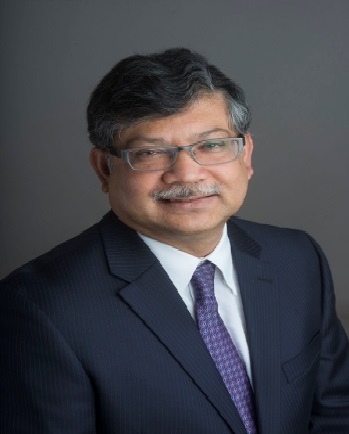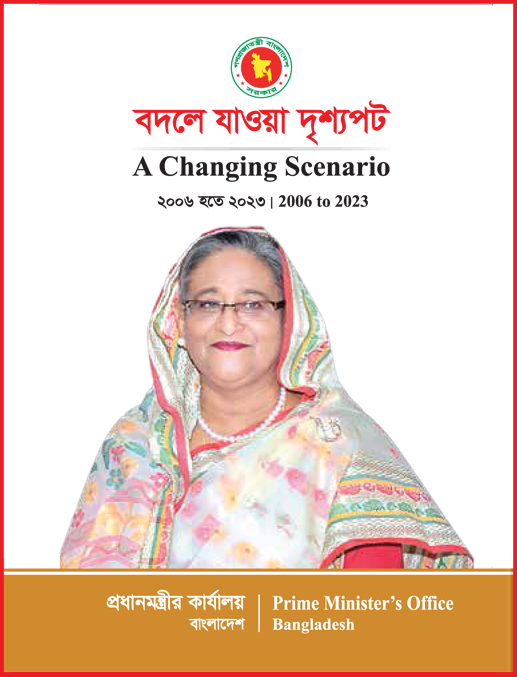Speech of H.E. Dr. A.K. Abdul Momen, MP Hon’ble Foreign Minister of Bangladesh at the Inaugural Session of the Dhaka Global Dialogue
Assalamu alaikum, peace be on you
Hon’ble Prime Minister Sheikh Hasina
Hon’ble Ministers,
The Honorable Members of Parliament
Excellencies
Distinguished delegates,
Ladies and Gentlemen
I am delighted to welcome you all in today’s Inaugural Session of the Dhaka Global Dialogue 2019. The very presence of our leader, Hon’ble Prime Minister Sheikh Hasina, Ministers, Senior Officials and distinguished guests and delegates from the all over the world– is a manifestation of our shared aspiration and collective will for a better future through a joint and forward looking development and strategic cooperation facing the evolving international realities. Bangladesh takes pride to promote the concept of ‘pro-people, pro-planet, more inclusive, more peaceful sustainable world for all’ where ‘no one is left behind’ being included in the SDGs and Prime Minister Sheikh Hasina promoted the ‘concept of peoples empowerment: a peace-centric development model’ that was adopted at the UN with consensus in 2012 and it states that ‘human beings will be faced with emerging and newer challenges, and to manage them effectively, it is necessary to empower people, both men and women, and in order to empower them, it identified 6-inter-linked variables such as (1) end of poverty and hunger, (2) inclusion of the deprived or left-outs, (3) providing quality education, newer technology and improved skills and training, (4) gainful employment, (5) right to participate in governance and (6) end of terrorism and extremism. In the document “The Future We Want’ at the Rio+20 Summit in 2012 followed by ‘2030: Agenda for Development’ in 2015, the global leadership adopted the development initiatives that will promote 5Ps namely; (1) People, (2) Planet, (3) Peace, (4) Prosperity and (5) Partnership. The goals of ‘Future We Want’ or that of SDGs cannot be achieved without rock-solid political commitment and collaboration and partnership.
Ladies and gentlemen,
Today’s Dhaka Dialogue, I am confident will be a key event to discus, analyze and even chart out changing regional and global political order and the position and role of Bangladesh vis-a-vis the emerging international setting. ‘Dhaka Dialogue’ hopefully, will be a permanent platform for all relevant bodies and stakeholders to look across the challenges, solutions, opportunities and ideas regarding development, environment, globalization and even people-centric governance.
Time and strategic location has given the larger Indo-Pacific region a clear advantage and it will be a pity if we cannot build on the existing successes presented by the ‘Asian Century’. In this respect, I believe, the Dhaka Dialogue will set an example for exploring ways and means of human development based on mutual respect and trust, common prosperity and shared responsibility and partnership.
Excellencies, ladies and gentlemen
You all are aware that despite many challenges, Bangladesh has often been cited by UN as a ‘role model for development’, a ‘star of women empowerment’, and the Wall Street Journal termed it as the ‘standard bearer of the South’. Our country has continued to prosper over the last 10 years and has recorded, as per Asian Development Bank, the highest economic growth rate among the 45 Asia-Pacific countries, with its GDP growth rate at 8.13%. However, our secret for economic development is “Sheikh Hasina Magic’----her strong determination and leadership quality, and our collective commitment towards fulfillment of the dream of the Father of the Nation Bangabandhu Sheikh Mujibur Rahman to make Bangladesh a Shonar Bangla - the Golden Bengal, a prosperous and stable economy. And thanks to the vision, pragmatism and statesmanship of our Prime Minister Sheikh Hasina, Bangladesh is now truly on its journey towards becoming a mid-income country by 2021, and hopefully will attain the SDGs by 2030, become a developed country by 2041 and a ‘Prosperous Delta’ by 2100.
To achieve that vision, we continue to embark upon pragmatic programs for rapid economic and social development. Poverty eradication, sustainable growth, protection of the environment, use of digital technology and more importantly, human-resource development are some of the key features of our development strategy. We found poverty and inequality are two major obstacles. Bangladesh has achieved one of the fastest poverty reduction rates in the world with poverty rate dropping almost half from 41.5% to 21.3% in 2018, extreme poverty from 24% to 11.3% and we propose to reduce it by another 5% within next 5 years. Our extensive rural development initiatives and social protection programs like ‘My Village My Town’, ‘Ashrayan’, Bidova-batha, Food for Work, VGP card, ‘Amar Bari Amar Khamar’ etc, have contributed to our ‘inclusive development and reduction of inequality’. Bangladesh has been ranked 34th in World Economic Forum’s Inclusive Development Index leaving other countries in this region way behind. World Bank showed that Bangladesh lifted 8 million out of poverty within last 6 years, from 2010 to 2016. Therefore, I term Bangladesh Development as a ‘Humane Development”.
Ladies and gentlemen,
Bangladesh’s vulnerability to climate change impacts is well-known and well documented, losing almost 2% of our GDP annually due to this menace. However, on this front – the story of Bangladesh is not only the story of vulnerability. In fact, it is completely the opposite. Ours’ is a story of adaptive resilience which could be emulated by countries under similar threats. With almost no resources, we are addressing the consequences of the climate change and natural disasters in our own ways. As early as 2009, Bangladesh adopted a Comprehensive Climate Change Strategy and set up two Trust Funds to meet the challenges although our contribution to global warming is almost nil or negligible. At present, we spend more that 1% of our GDP in combating climate change. At the same time, we are pursuing a low carbon development path with increasing emphasis on renewable, energy efficiency and better energy conservation. Over the last few years, we have installed more than five million solar home systems in off-grid areas. Within next five years, we are going to increase our tree coverage to nearly 24%. So far Bangladesh has created 0.2 million hectares of dedicated coastal forests as protection from tidal surges and calamities in addition to 600,000 hectares of the Sundarbans Mangrove forest, a carbon-sink. From our climate smart agricultural technologies to 80,000 disaster volunteers, from floating agriculture, salinity-resistant and water-prone crops to the grass root level detail management plan for any kind of disaster, it is all a human tale. A tale of tremendous preparedness, unity, resilience, and local innovation of our people which has been amply manifested once again just yesterday when storm ‘Bulbul’ attacked us.
Excellencies,
Under the direct guidance of the Hon’ble Prime Minister, we have given high priority to human resource development, to education, health, energy, infrastructure, skill development, digitalization and adaptation towards climate change impacts. To start with, for ensuring equal access to education, millions of free books are being distributed among students up to secondary level. In addition, thousands of Digital Labs have been introduced to class rooms. Different stipends are being provided to more than 28 million students. Recently a project of providing lunch during school time has also been undertaken for students. E-learning and massive teachers’ training are ongoing to ensure quality education. To reach the poorest and the last one in the line with basic health care, we have established a network of 18,000 Community Clinics and Union Health Centers so that the emergency and basic health care reaches people’s door, including to those who are differently able. To provide variety of government services at people’s door steps, under the guidance of Prime Minister’s IT Advisor Sajeeb Wazed, we have introduced ‘333’ hotlines, ‘999’ emergency lines and my Ministry, in order to provide better services to our people especially to 11 million Diaspora has introduced ‘Dutabash’ aps, a digital technology by which nearly 34 services could be received with finger tips saving time, money and visits.
We consider SDGs implementation as a continuation of our MDGs efforts. Bangladesh was one of the few countries who did attain almost all of the MDG targets. Realization of the MDGs helped Bangladesh towards graduation from the LDC status, fulfilling all three criteria for graduation. Now we intend to do the same with the implementation of SDGs. For this, we took a three pronged approach. These are: mobilization of resources, both fund and technology, capacity building and people’s empowerment at all stage of decision making process. We understand, implementation of SDGs requires much greater, long-term and sustained flow of resources. The preliminary assessment reveals that in Bangladesh, we may require around USD 930 billion of additional synchronized expenses for full implementation of the SDGs. For a developing country like Bangladesh, even with our impressive growth rate and social innovations, the burden is truly great. Therefore, we need partnership; Regional partnership, government to government partnership, government and business partnership, government and academic plus NGOs, Think Tank and philanthropic partnership, the South-South and North cooperation and innovative finances and technology to achieve the goals.
Moreover, to face the upcoming advent of 4th Industrial Revolution, a dramatic technological innovation, we are building partnerships, where government, private sector, academia, community and civil society -- all are working together. Bangladesh has now the 2nd largest pool of ICT freelancers in the world, almost 600,000.
Distinguished Delegates,
You all know, out of humanitarian consideration and to avert a disaster, Bangladesh Prime Minister gave shelter to 1.1 million forcefully displaced persecuted Rohingyas of Myanmar in Bangladesh. Now, it is the responsibility of the global community, including our neighbors, to do more to ensure their quick and sustainable repatriation and reintegration in Myanmar. This is an issue created by Myanmar and solution also lies with them. Voluntary return of the Rohingyas to their homes in the Rakhine state in safety, security and dignity is is a crying need of the hour.
Excellencies,
We are truly living in the Asian century. The countries in the South Asia – India, Bangladesh, Nepal, Bhutan and many others in the South East and East Asia are growing at a much faster rate than all other countries in the world. However, it is not only the rate of growth, but the sustainability and just distribution of benefit of that growth that makes these fast growing economies so important. However, I personally see a vast area of possible future cooperation among us. It is undeniable fact that intra-regional trade and physical connectivity are still insignificant compared to their true potential. So through our Dhaka Dialogue, our active collaboration and cooperation will be further successful to expand the areas of cooperation and understanding for our common benefit.
Before I conclude, I have one message. Without peace and stability, no country or region can prosper, can achieve their goals. Of late, there are varieties of media including social media at times promote venom of hatred and intolerance. Such venom of hatred and ignorance results in violence and wars. In order to have a sustainable world of peace and stability, it is important, that we all help creating a mindset of respect for each other, a mindset of tolerance irrespective of ethnicity, color or religion or background. To inculcate such a mindset, I urge everyone, parents, guardians, teachers, Opinion builders, Think Tank, Media, community leaders, leaders of Mandirs, mosques, synagoys, churches and the governments to join hands together for a sustainable world of peace and stability. Let the Dhaka Dialogue take a lead to this end.
I again thank BIISS and ORF for jointly organizing this Dialogue and especially my Colleague State Minister for Foreign Affairs Md. Shahriar Alam and Nayeem Razak, MP and I assure you our whole-hearted support and wish this Dialogue a grand success. Let us open our mind and let me conclude by echoing our great Bengali poet Rabindronath Tagore, and he said and I quote,
“Onthro momo bikoshitho koro, Onthoro thoro hey,
Juktho Koro hey Shober Songey, Muktho Koro hey Bandho
Ujjal koro, Nirmol koro , nonditho koro, Sundor koro Hey”
Joy Bangla, Joy Bangabandhu













